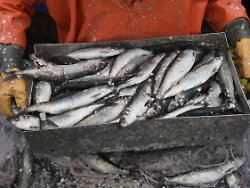Tuesday, October 12, 2021
Fisheries Association is angry
The EU only allows Baltic herring as by-catch
After 20 hours of negotiations, the EU fisheries ministers agree on the fishing quotas for 2022. Due to the poor state of the stocks, herring and cod can only be caught as bycatch in the Baltic Sea – “a disaster” for the industry, says the fisheries association.
After long negotiations, the EU fisheries ministers have agreed on fishing quotas for 2022: fishermen in large parts of the Baltic Sea will not be allowed to catch herring and cod in the coming year, unless they are caught in the nets as bycatch. Due to the continued poor condition of the stocks, the EU Commission had proposed a fishing ban for these two fish species in the western Baltic Sea.
According to the Federal Ministry of Agriculture, an exception applies to herring fishing for ships under twelve meters in length that work with set nets. You are still allowed to target herring. However, active fishing gear such as towed trawls should be banned.
For plaice and sprat, which are also fished intensively by German fishermen, the fisheries ministers agreed on slight increases in the quota. The permitted catch for plaice is 25 percent more, for sprat 13 percent more.
Cod quota drops drastically
By restricting the targeted fishing for cod in the western Baltic Sea, the catch quota in this area, which is important for German fishermen, will fall by 88 percent according to the agreement reached by the EU ministers. Targeted fishing was already prohibited in eastern waters. The salmon fishery in the main basin must be reduced by 32 percent, while the quota off the Finnish coast remains almost unchanged at an increase of six percent.
21 percent more herrings can be fished in the Riga Bay. Recreational anglers are allowed to fish one salmon and one cod each day. Before the ministers responsible for fisheries come to an agreement, the EU Commission presents them with recommendations every year. The EU Commission relies on assessments by the International Council for the Exploration of the Sea (ICES).
Germany did not agree to the resolutions. The EU Commission applied “different standards” to the Baltic Sea fishing areas and the Kattegat and Skagerrak areas to the north, the Federal Ministry of Agriculture said. “It cannot be that our fishery in the Baltic Sea has to accept massive cuts. But on the other hand, meanwhile, fishing in more northerly waters, be it in Kattegat or Skagerrak, continues”, said Minister Julia Klöckner.
Environmentalists satisfied
EU Environment Commissioner Virginijus Sinkevicius was satisfied with the decision of the fisheries ministers in Luxembourg. It was possible to “reach a responsible, balanced agreement that will help us to rebuild fish stocks in the Baltic Sea fisheries,” he said. At the same time, he called on member states to tackle “the main sources of pollution” such as agriculture. “Our fishermen shouldn’t pay the price for what goes wrong on land”.
The environmental protection organization BUND welcomed the agreement: “There must be no ‘business as usual’ in the Baltic Sea fishery, because otherwise it will soon be not just fish that hang on the hook, but entire species and ecosystems.” Greenpeace called for “consistent protected areas – this is the only way to stop the death of the Baltic Sea”.
Fisheries Association reacts indignantly
According to the fisheries association, there are serious consequences for the industry. “The bottom line is that for the German fishery, it has to be said quite clearly, a catastrophe,” said association spokesman Claus Ubl. Cod and herring are the “bread fish”. “And if these are shortened to such an extent that you can no longer fish them specifically, then everyone can calculate that hardly any fisherman can survive there,” said Ubl.
It remains to be seen what relief measures will come. “But I expect that there will be a structural change in German Baltic fisheries in the next few years,” said Ubl. Important structures are likely to collapse because they can no longer be maintained. “Because if I don’t catch any fish, I can no longer hold structures such as cold stores, ice machines and other things – and once they’re gone, they’re gone.” No one can yet say where the Baltic Sea fisheries will develop. Perhaps the federal government will launch another scrapping program. Increasing the quotas for plaice and sprat will help some fishermen survive.
